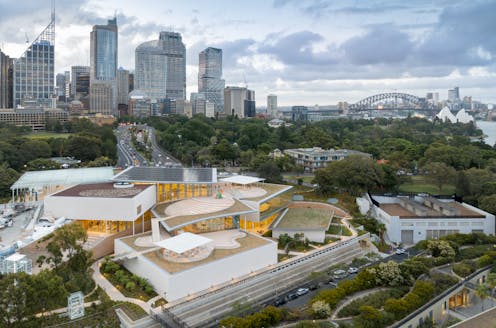
The Sydney Modern Project had the odds stacked against it since its inception in 2013. It has surely been the most controversial state gallery extension to be built in Australia.
Michael Brand – a Canberra-born, ANU and Harvard trained art historian with an outstanding museum career in Australia and America – was appointed as director of the Art Gallery of New South Wales in 2012. This was on the retirement of Edmund Capon, who held the post for the preceding 33 years.
Brand launched the unfunded plan for a new building in 2013, the Tokyo firm SANAA won the architectural competition in 2015 and construction commenced in 2019 with a budget of A$344 million. The knives were quickly out for Brand and his project.
Some, like Paul Keating, did not like the location and called it a “gigantic spoof”.
Others did not like the design; a book was published by a former gallery employee attacking the project; and the new culture at the gallery. Prominent people in the Sydney art scene lined up to attack the project and the director.
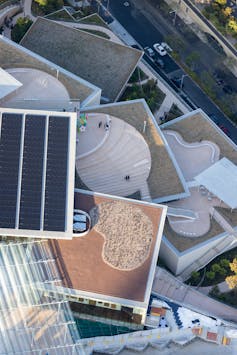
There were some people who simply did not like Brand. He is a reserved, scholarly individual with a brilliant eye, in total contrast with the flamboyant, media savvy Capon.
There were faults with the original architectural design and significant modifications were implemented before construction commenced.
There were also external circumstances that impacted on the project: the murky world of NSW state government politics, bush fires that shrouded Sydney in smoke, COVID-19.
However, Sydney Modern, now that it is open, is a spectacular achievement. The floorspace of the gallery has almost doubled, creating a gallery precinct (Brand prefers to call it a “gallery campus”) with two buildings connected by an art garden.
On one side we have the stately neo-classical building that looks like a traditional 19th century art gallery with a series of extensions by Andrew Anderson, on the other side, a new 21st century structure.
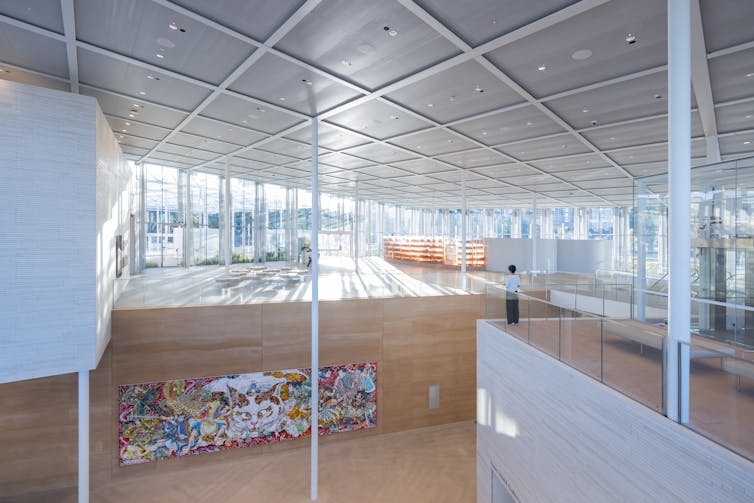
Read more: 'Like walking into a crystal': our first preview of the Art Gallery of NSW's new Sydney Modern
A luminous birdcage
The new building may be described as a three-storey, luminous birdcage with suspended hanging gardens and an extensive crypt below. The main architectural concept is that of three limestone-clad, cascading pavilions leading down towards the water with a huge supporting rammed earth wall.
Below is the crypt, locally called the “tank”, in recognition of its origins as a fuel storage reservoir secretly and speedily constructed at the start of the second world war to store fuel for Allied shipping.
It reminds me of the huge water cisterns in Istanbul constructed by the Byzantines to store water for the city.
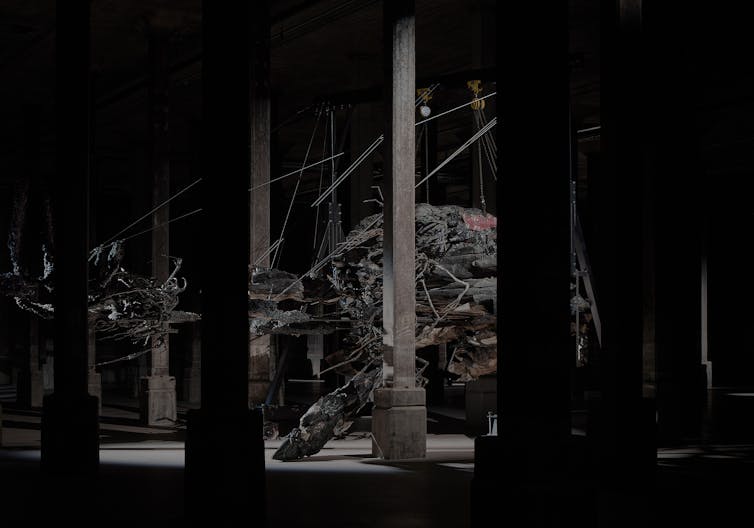
The tank is presently occupied by Adrián Villar Rojas’ “time-travelling sculptural forms” dramatically lit by constantly changing light sources. The smoke and mirrors display is deliberately disorientating, evoking more of a mood than a visual assessment of the artwork.
In the upstairs birdcage, it is very easy to orient yourself and be aware of your location and the various possible exits. In the crypt all is murky and unpredictable as you gradually negotiate the spaces and dodge the pillars and protruding sharp edges of the sculptures.
Indigenous art at the heart
Although there is an emphasis on Indigenous art with the transfer of the Yiribana Gallery from the basement of the old building to the entry gallery of the new one, this is more than simply a symbolic gesture to have Aboriginal and Torres Strait Islander art at the heart of the gallery.
Indigenous art is found at all levels of the new building and is integrated into the display of non-Indigenous Australian and international art.
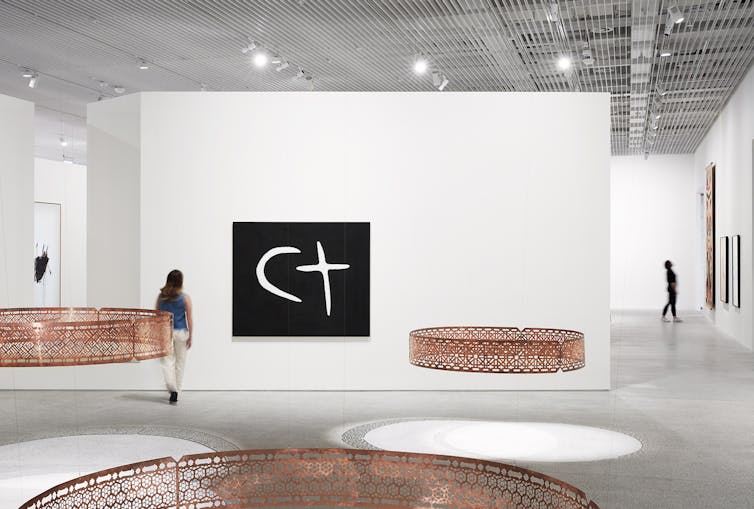
One of the highlights for me are the newly commissioned woven metal pieces by Lorraine Connelly-Northey. Her huge metal handbags made from discarded, well-weathered metal sheets from the outback have a stark sense of presence and are laced with wit.
Her work looks out onto the most ambitious project, the sprawling art garden by Jonathan Jones scheduled to open mid-2023.
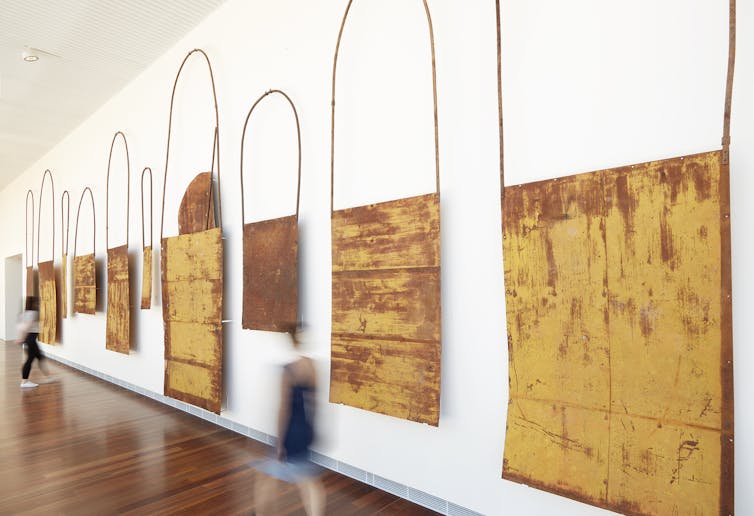
Less a deliberate policy and more as part of the process of what Brand describes as selecting the most interesting new art, women artists make up 53% of the 900 exhibitors in the new building.
The major thematic groupings, or exhibitions, in the new building are Dreamhome: Stories of art and shelter, Making worlds, Outlaw and Rojas’s The end of imagination in the crypt. These will remain in place for the next six months before there is a new set of exhibitions.
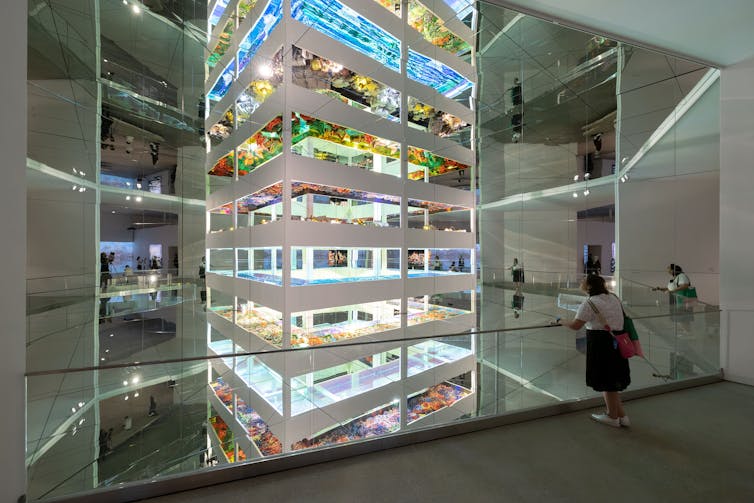
An elegant build
Despite the slings and arrows, Sydney Modern (now known somewhat unimaginatively as the North Building of the Art Gallery of NSW) has come to fruition.
Possibly not the most magnificent art gallery in the world, as the NSW premier and his arts minister spruiked at the opening, but an elegant, formidable and very functional new building.
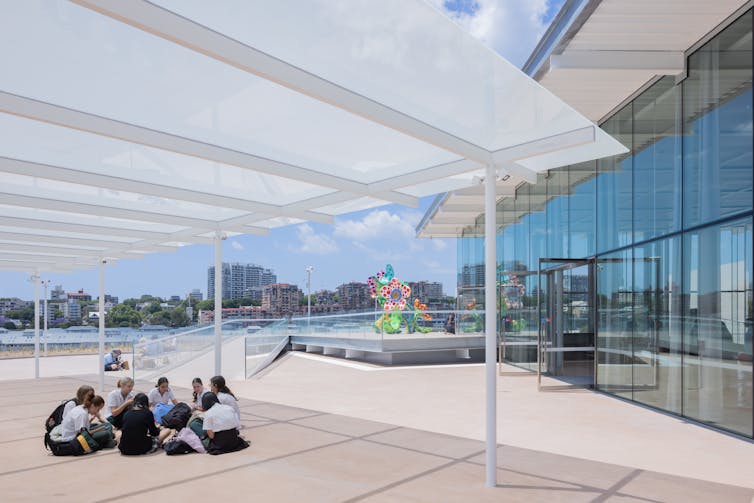
Politicians in Australia have always been very good at throwing money at new buildings, the true test will come if this doubling in size of the gallery will be accompanied by a substantial increase to the operating budget of the institution.
With new gallery spaces projected for Melbourne, Adelaide and possibly Canberra, funding is required for more than rammed earth, glass, bricks and mortar. Australia does not need a stampede of white elephants.
Read more: Eco-activist attacks on museum artwork ask us to figure out what we value
Sasha Grishin does not work for, consult, own shares in or receive funding from any company or organisation that would benefit from this article, and has disclosed no relevant affiliations beyond their academic appointment.
This article was originally published on The Conversation. Read the original article.







